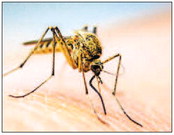Mosquitoes test positive for West Nile virus in OC


VECTOR CONTROL
Mosquitoes collected in Fullerton have tested positive for West Nile virus (WNV), according to the Orange County Mosquito and Vector Control District (OCMVCD).
These are the first samples to test positive in the county this year, according to OCMVCD.
WNV is primarily transmitted to humans through the bite of infected mosquitoes, which acquire the virus when feeding on infected birds. As of publication, Orange County has not reported any human cases of West Nile
WEST NILE, page 3 virus.
“Mosquitoes testing positive for West Nile virus is an indication that the virus is circulating in the community. Fullerton is historically a high-risk area for West Nile virus activity. Conditions across the region are favorable for sustained virus activity during the warm summer months,” said Amber Semrow, director of Scientific and Technical Services for the vector control district.
District staff will continue to conduct surveillance, inspections and control measures for mosquitoes in the area to prevent additional mosquito breeding.
OCMVCD will also post West Nile virus advisory signs alerting residents of virus activity in the affected area.
“Proactive involvement from the community in this effort is essential. Simple steps like checking for standing water around your property can help,” said Heather Hyland, director of communications for the vector control district. “The best way to protect yourself is using EPA-registered repellent, wearing long-sleeved clothing, and spreading the word to friends and family.”
According to the Centers for Disease Control and Prevention, about four in five people infected with West Nile virus do not develop any symptoms.
However, one in five who are infected develop a fever with other symptoms, such as headache, body aches, joint pains, vomiting, diarrhea or rash.
Most people with febrile illness due to West Nile recover completely, according to the CDC, but fatigue and weakness can last for weeks or months.
People are encouraged to take the following steps to prevent mosquito bites:
• Dump and drain containers filled with water at least once a week.
• Clean and scrub bird baths and pet water bowls weekly.
• Dump water from potted plant saucers.
• Wear repellent containing DEET, Picaridin, IR3535 or oil of lemon eucalyptus.
• Close all unscreened doors and windows to prevent mosquitoes from entering your home or space; repair broken or damaged screens.
For more information about prevention, visit www.ocvector. org.




